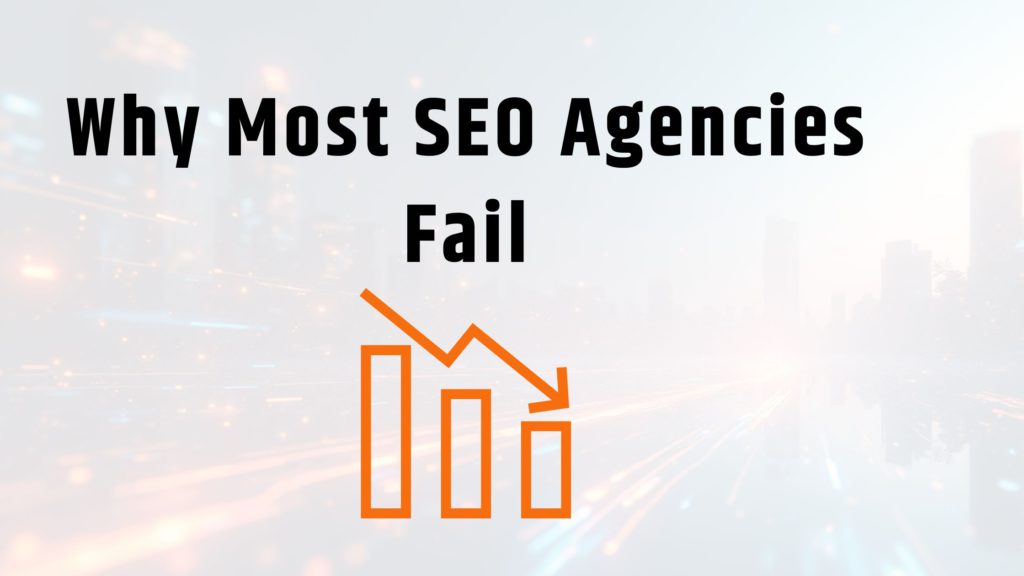Almost every Indian business owner today has a story about hiring an SEO agency that overpromised, underdelivered, and quietly disappeared after sending the same monthly report for six months straight. The rankings barely moved, the traffic didn’t convert, and the sales pipeline looked exactly the same as before. Eventually, the business draws the wrong conclusion: “SEO doesn’t work.”
But SEO does work. What doesn’t work is the way most agencies execute it.
The real problem isn’t Google — it’s the outdated, superficial, copy-paste approach used by a majority of SEO providers in India. They focus on deliverables instead of outcomes, quantity over strategy, and shortcuts over expertise. SEO hasn’t become harder; it has simply evolved. Unfortunately, most agencies haven’t.
A modern SEO consultant thinks like a strategist. A weak agency thinks like a task executor. And that difference alone determines whether your SEO investment grows your business or drains it.
Let’s explore the real reasons most SEO agencies fail — and what Indian CEOs, founders, and SMEs must demand instead.
1. The Backlink Obsession: A Shortcut That No Longer Works
The biggest giveaway that an agency is outdated is their standard pitch:
“Sir, we will give you 30 backlinks per month.”
Backlinks are not a strategy — they are an outcome of good content, brand trust, and authority. When agencies promise bulk backlinks, it means they rely on cheap link farms, low-quality directories, or irrelevant guest posts.
Google’s modern ranking system evaluates content through the lens of trust, credibility, experience, and contextual relevance. When these fundamentals are missing, no number of backlinks can save a website.
This is why many businesses see rankings spike temporarily and then crash — because artificial authority is not authority at all.
2. Random Blogs, Zero Strategy
Most agencies treat blogging as a checklist.
“10 blogs per month → SEO completed.”
But SEO has evolved far beyond that. Publishing articles without topical mapping, customer intent, or internal linking is like throwing seeds on concrete and hoping something grows.
Blogs must follow a narrative structure — clusters, sub-clusters, pillar pages, and intent-based content journeys. Customers don’t search randomly; they move through awareness, consideration, and decision stages.
Agencies that ignore this funnel thinking produce content that looks active but performs dead.
3. Ignoring Technical SEO (The Silent Business Killer)
Many agencies simply don’t have technical SEO experts — and it shows.
Technical SEO is the foundation of search visibility. If your website has crawling issues, canonical confusion, broken structures, duplicated pages, slow loading, or poor mobile performance, no amount of content will compensate for these weaknesses.
A great SEO strategy starts with fixing the structure first, not after.
When technical fundamentals are ignored, the entire SEO strategy collapses like a building built on weak soil.
4. Outdated SEO Practices That Should’ve Died in 2012
Keyword stuffing, spun articles, PBN links, article submissions, directory blasts — these tactics are still shockingly common in India.
The problem isn’t just that they fail.
The problem is that they can actually harm the website.
Google’s algorithms today prioritize depth, context, and meaning. Thin content and artificial signals do the opposite.
If your agency still talks about “keyword density” or “article submissions,” it’s a sign they haven’t evolved in a decade.
5. Zero Understanding of Google SGE (AI Search)
Search is undergoing its biggest transformation since 2008.
SGE (Search Generative Experience) is changing how answers are delivered. Agencies that don’t adapt to SGE optimization — conversational intent, structured answers, entity enhancement, and AI-friendly formatting — are already falling behind.
If your SEO partner doesn’t mention SGE, entities, or answer optimization, they are building your SEO for yesterday’s Google, not tomorrow’s.
6. Reporting That Looks Fancy but Says Nothing
Most agencies send 12-page PDFs every month — keywords, impressions, backlinks, charts.
But none of it answers the only questions business owners truly care about:
- Did my qualified traffic increase?
- Are my conversions improving?
- Which content brought revenue?
- What business decisions should I make this month?
Real SEO reporting must feel like a business review, not a task list.
7. No Industry-Specific Expertise
SEO is no longer generic.
A B2B manufacturer, a real estate company, a hospital, and a D2C brand require completely different systems, content strategies, and conversion architecture.
Yet most agencies use the same template for every client.
This is why so much content written by agencies sounds flat, repetitive, and disconnected from the real customer.
8. Deliverables Over Outcomes
Most agencies measure success by:
- number of backlinks
- number of blogs
- number of keywords ranking
But none of these metrics pay your bills.
SEO should be measured by:
- pipeline growth
- revenue influence
- lead quality
- conversion improvements
Businesses don’t need deliverables — they need outcomes.
And this mindset shift is what separates real SEO partners from task-driven agencies.
Conclusion: SEO Doesn’t Fail. Weak Systems Do.
The biggest mistake Indian businesses make is choosing SEO partners based on deliverables instead of depth.
A great SEO strategy is built on research, psychology, technical foundations, content authority, and market insight — not backlinks and blog counts.
If you want SEO that grows your business, you must demand clarity, transparency, and strategy — not tasks.
If you want SEO that aligns with revenue instead of deliverables,
Brand Chanakya builds SEO systems designed for long-term business growth, predictable visibility, and sustainable demand generation.
Follow us on Instagram:- @brand_chanakya

